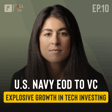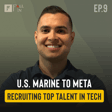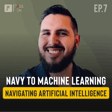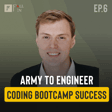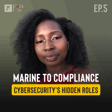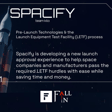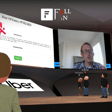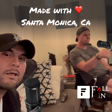Become a Creator today!Start creating today - Share your story with the world!
Start for free
00:00:00
00:00:01

Fall Into Tech #8: Eric Shu - Marine to Venture Capital
Marine veteran Eric Shu shares his journey from artillery officer to venture capitalist in this insightful episode. Discover:
- Eric's career evolution from Marine Corps artillery officer to MBA graduate, and his transition into the world of venture capital
- Insights into the venture capital industry, including how VCs evaluate startups and make investment decisions
- How military skills like adaptability, leadership, and strategic thinking translate to success in the tech investment world
- The day-to-day realities of working as a VC, including sourcing deals and supporting portfolio companies
- Advice for veterans interested in tech careers or entrepreneurship, emphasizing the importance of hands-on experience and continuous learning
Whether you're a transitioning service member, aspiring entrepreneur, or curious about venture capital, this episode offers valuable insights into succeeding in the fast-paced world of tech investment and startup ecosystems.
GUEST INFO:
- Eric Shu LinkedIn
- Access Venture Partners
- Pitch and Run Colorado (Luma)
- Pitch and Run Colorado (Instagram)
EPISODE LINKS:
- The Power Law (Book about Venture Capital)
- Acquired Podcast
- Marine Innovation Unit
- Defense Innovation Unit
- Teach for America
PODCAST INFO:
- Podcast website: https://www.fallintotech.com/
- Youtube
- Apple Podcast
- Spotify
- Zencastr
SOCIAL MEDIA:
HOST INFO:
Transcript
Introduction
00:00:04
fall_in
All right, welcome to the fall into tech podcast hosted by myself. I'm Jamil Mattin, and I'm here with Michael Rodriguez.
Host Backgrounds
00:00:11
fall_in
We're two Marines turned techies. And on this podcast, we chat with fellow veterans about their journey from military to technology, as well as other tech professionals to help you with your tech career.
00:00:25
Michael Rodriguez
Yeah. Uh, tune in weekly for guest interviews where we discuss specific tech roles, career paths, and just overall tips for succeeding in tech.
Meet Eric Shu
00:00:34
Michael Rodriguez
And today we have Eric shoe on. Thank you for joining us, Eric.
00:00:40
Eric Shu
Definitely nice to meet you. You may have been seeing again, Mike.
00:00:43
Michael Rodriguez
Yeah, for so Eric is a Marine Corps artillery officer turned venture capitalist. And I actually met Eric while we were both at artillery school in the beautiful and scenic Fort Sill, Oklahoma, which is a joke in case anyone's never been there before. But Eric, so we usually start off with a fun fact of for the guests. So you have fun fact about yourself?
00:01:10
Eric Shu
Yeah. Wow. You guys go in hot and heavy with the fun fact that that was going to be until later, but, uh, you know, I, uh, you know, I'll share one fun fact that I live out in Colorado, uh, do a lot of trail running. And since I moved out here, I've been, uh, doing some a hundred mile trail runs and so something I've been getting into, uh, since I've been out here in the mountains.
00:01:34
fall_in
Wow. Were you doing ultra running, even back when you were in? Or is that something recent?
00:01:34
Michael Rodriguez
Nice.
00:01:38
Eric Shu
No, no, I was never really a runner. And then the Marine Corps had something called a PFT. And apparently in OCS, you you were supposed to run a lot. And that was kind of the extent of my and running, right? kind of yeah What do I need to do to survive the PFD? And then once I got out here, I love the hiking, love the running. And with with just so many beautiful trails out here, just something I've grown to enjoy doing.
00:02:07
fall_in
That's awesome. I've always had like these, I don't know, dreams, as I guess you could say, to to one day do an ultra marathon. We'll see how that goes. But no, it's it's funny you mentioned that. And I think, you know, you you do have such a unique background, you know, being a Marine and and now into the VC land. Let's let's talk about
Joining the Marine Corps
00:02:27
fall_in
the Marine Corps. Could you tell us why you you know chose the Marines versus any other branch here?
00:02:32
Eric Shu
Yeah, for sure. So after college, I ended up first working as a middle school teacher with Teach for America down in South Louisiana, moved to Washington DC after that and working tech policy. and Being in DC, as as you both know, you you meet a bunch of folks that are either in the military, you know recently left or veterans, and then you're just part of the whole kind of a military community out there. and and so
00:03:06
Eric Shu
i During my time there, I had an opportunity to meet with a lot of great folks that had served or were serving. A majority of them were were you know Marines. And you know when I kind of made the decision to join, I didn't think, oh, I'm going to join a military. I thought, hey, I want to join the Marine Corps. like That's the group that I really want to be a part of. That's kind of where I've met the best people. Quantico was right down the street. so Didn't have to travel too far to get things started, but it was something I'd always thought about. you know Public service, public sector work.
00:03:43
Eric Shu
In a lot of ways, the Marine Corps was kind of the the highest form of service for me and and so excited to join that specific branch, less so, hey, I want to go do something in the military.
00:03:56
fall_in
Nice. And I totally agree. I was kind of the same way. It was like Marine Corps or nothing else. But walk us through your logic on why you chose the reserves versus active duty.
00:04:07
Eric Shu
Yeah. you know so When I was getting ready with the local recruiter's office, you know they They say, hey, we can send you next year if you want to go active duty or we'll send you in three months. If you take a reserve contract, we'll or or send you out in three months. I was ready to go. I got to a point in in my civilian job where I was a good point to move on. I was ready to go and I didn't want to wait another year.
00:04:42
Eric Shu
and you know I started speaking to to some other reservists that I met, and they all kind of talked about the flexibility of the reserves, where you you you go in the initial pipeline, you have the same exact training through OCST, TBS, MMS school, and then after that, you have some flexibility to what you want to do with your career. I didn't really understand that until I actually got in commission and kind of was on that path. But you know since then, I've looked back at my career and a lot of things I've gotten to do have been because I've been a reservist. And so for me, initially, it was just how do I get to the fleet the fastest? How do I go and be in the Marine Corps as soon as possible?
00:05:26
Eric Shu
And it was, hey, you take this reserve contract, you'll you'll go in three months. And that's and you know really what's a catalyst on why I chose you know reserves over active duty.
00:05:39
fall_in
Totally. and
Marine Innovation Unit
00:05:41
fall_in
And so what years were you in and and give us your MLS?
00:05:45
Eric Shu
Yeah. So commission in 2014 and then end of 2014 was when I started TBS. 2015 was when I met Mike over at you know beautiful Fort Sill. Side note, my intern right now at AXS Venture Partners is actually from Lawton. I didn't know anybody that was actually from Lawton, but not now I know somebody who's local. and Anyways, commissioned as a artillery officer. yeah I got into the Marine Corps thinking I was going to be reservist. Maybe I'll do something that is transferable to the civilian world. right Maybe I'll do supply chain or logistics or something that exists both in the military and in the civilian world. But then we went up to some effects with cannons and then I pulled the lanyard and just
00:06:35
Eric Shu
had to do artillery, like that was it, right? And so, kind of pivoted during my time at TBS, but, you know, wouldn wouldn't give that up for anything else. 0802.
00:06:46
fall_in
Pretty Moda man. Tell us about, I saw that you have some attachment to MIU, Marine Innovation Unit.
00:06:47
Eric Shu
Yeah.
00:06:55
Eric Shu
yeah Yeah, you know.
00:06:56
fall_in
you know I got out in 2012, so I don't have any kind of knowledge or experience with it. So it'd be great to have some come to this.
00:07:04
Eric Shu
Yeah, you know, I actually got off of kind of my, so I got out of active duty time in 2017. I actually took an activation to 8L orders after I finished up at MOS school. You know, came back, did SMCR, did the whole drilling thing, and got, you know, he just got busy with work, dropped into the IRR for about four years. And kind of during that time, the Marine Innovation Unit was was started up. And you know I was thinking, hey, maybe this is an opportunity for me to jump back in. They're looking for folks with consulting or technical or engineering experience. A lot of these kind of capabilities and skill sets that you don't see organically within the active duty component, but
00:07:50
Eric Shu
no Marines were being Marines, they've they've gone out to do these interesting things in civilian career. And so when I heard about the unit, I said, hey, maybe I'll i'll give this a go. I've done consulting in the past. I work in tech. Maybe there are some skill sets that I can bring that would be helpful for for the mission, right for the Marine Corps. and And so in 2022, decided to jump back into new drilling reserves and and join MIU. And so today, it's still considered a startup, you know essentially, with the unit, which is kind of cool. You see a lot of folks jumping in, figuring things out. Everybody's wearing different hats. And so a super awesome comm community to be a part of that really allows me to leverage some of my civilian skill sets.
00:08:38
Michael Rodriguez
Can you go into a little more detail on I guess what civilian jobs they're interested in? If you know at MIU.
00:08:45
Eric Shu
Yeah. At MIU, yeah. So MIU, you can kind of think of it as a a consulting firm for the Marine Corps. you know You might have heard about DIU, the Defense Innovation Unit. They have Acquisitions Authority kind of leading the charge in terms of innovation within DOD. But the Marine Corps' Innovation Unit is really a pool of talent, a pool of reservists that have skill sets ranging from consulting. Some are CEOs, some are software developers. Some folks ourite like me are our investors. We have people that have strong academic backgrounds, PhDs in a number of areas, data science, AI, ML.
00:09:33
Eric Shu
And so the Marine Corps and the Marine Innovation Unit is really looking for these skill sets that you know you don't really find in the specific MOS. There's not an MOS for data science. right But you know there are Marines out there that have these skill sets. because they have a graduate degree or because they work at META or because they work at whatever it is. And so the unit is comprised of those individuals that still feel you know feel strongly about the mission and want to bring their civilian skill sets to work and apply that in in support of of the Marine.
00:10:09
fall_in
Very cool. Could you tell us your best and worst parts of being in?
Highs and Lows of Service
00:10:16
Eric Shu
Yeah. Best part, I think, got a chance to go out to Okinawa. just The experience and and being abroad was awesome. Really enjoyed that. I think on the flip side, the the worst part, you know I wouldn't say it was like a worst event, but you know you you lose a lot of the the flexibility and the freedom. when you're in the Marine Corps, when are you're when are you in the military, right? yeah you you You can't go to certain places. you You only can do things at certain times. And so you know granted, I think being a reservist gave me some more flexibility about when I wanted to do my Marine Corps work. But you know I wouldn't trade it for anything. I think the best part is you just kind of having the opportunity to travel. And with that, meeting the the awesome people that are in the Marine Corps
00:11:06
Eric Shu
One, I guess, a secondary benefit and in kind of secondary thing I i've realized after believing the Marine Corps and really the military is that it's it's this huge community that I never thought I'd be a part of and has allowed me to just meet super interesting people, even if they've left the service. And so that whole kind of network relationship aspect has something that I've only realized once I've kind of, you know, got off of that world.
00:11:39
Michael Rodriguez
Nice. And actually another question I just thought of for Marine Innovation Unit that might be unclear to people, but how do hours work for there? Like, I know, you know, someone who hasn't really ever been in the reserves, from what I understand, it's that, you know, you do one week in a month, but is Marine Innovation Unit on that same schedule, we have to show up and kind of do a week in a month type thing?
00:12:03
Eric Shu
so No, it's it is unique in how it's structured. so The headquarters is in New York, and at Newburgh Base, but that's really just where the INI sits. Everybody in the unit is is remote, is distributed across the country and even in other parts of the world. right and How we work is we work engagement by engagement, so it's really project-based. A client or a customer within the Marine Corps, it might be for a command or department. Somebody will say, hey, we have this problem set. We have this thing we're working on. We need to know more about it. MIU, is this something you can help with?
00:12:46
Eric Shu
MIU will pull together a project around that pinpoint, around that problem set, pull in a couple of people and research, interview, think about that problem and draft up some sort of proposal or or deliverable to help answer that question. And so the Marines involved in that engagement will track the number of hours and essentially build a Marine Corps. And so essentially you build up the number of hours that equates the number of drills.
00:13:16
Eric Shu
And then at the end of your kind of you know and end of your year, you'll hopefully have the satisfactory number of points to fulfill the requirements of being a a reservist. And so that's kind of how it works. you know On the drilling side, on the SMCR side, folks go for one week in a month, two weeks a year. They're in person and that's how they build up kind of the number of satisfactory hours needed. We still have to hit those kind of same drill requirements. We just do so in in a more kind of autonomous and flexible manner.
00:13:48
Michael Rodriguez
Awesome. Yeah.
00:13:49
Eric Shu
Yeah.
00:13:50
Michael Rodriguez
Sounds interesting. Definitely.
00:13:51
Eric Shu
Yeah.
00:13:52
Michael Rodriguez
Wish I would've knew more about that before I, you know, officially got out. out
00:13:56
Eric Shu
yeah I mean, you guys are both engineers, right? Or you guys are both in developer experience now?
00:14:03
Michael Rodriguez
I'm a software engineer, Jamil.
00:14:04
Eric Shu
Yeah.
00:14:04
Michael Rodriguez
You can.
00:14:05
fall_in
Yeah, I definitely have developer experience and background.
00:14:08
Eric Shu
Yeah.
00:14:08
fall_in
so But I feel like i've I've been out for so long.
00:14:09
Eric Shu
Yeah, I mean, there's definitely need for that.
00:14:13
fall_in
and i'm like I'm so like civilianized.
00:14:14
Eric Shu
Yeah, yeah.
00:14:16
fall_in
that I don't know.
00:14:17
Eric Shu
Yeah, no, that there's definitely have that, you know, I think I, I jumped back in after four years in IRR didn't thinking, not really thinking I was gonna get back in there, there, there definitely have been folks who have had to, that were out out were inactive, right. And I found out about the unit and had interest in in kind of serving again in that capacity. I had to go to a prior service kind of an you know recruiter and do all that stuff to get back in. so there There have been a couple of those cases.
00:14:46
Michael Rodriguez
Eric, the recruiter, he's recruiting back in, and get it get back in, Jamil.
00:14:50
fall_in
yeah
00:14:52
Eric Shu
They're coming for you.
00:14:52
fall_in
to Yeah, sleep on that.
00:14:53
Eric Shu
but
From Washington DC to MBA
00:14:57
Michael Rodriguez
Yeah, so, okay, so kind of, let's kind of talk more about tech here, but, so, looking at your education, you're a smart guy, obviously you went to Brown for your undergrad, and then you went to Columbia for your MBA, I'm curious,
00:15:01
Eric Shu
Yeah. Yeah.
00:15:14
Michael Rodriguez
you know, these are top tier schools. What were your career aspirations while in Brown? And then more recently your career aspirations while you were, you know, getting your MBA.
00:15:20
Eric Shu
Yeah.
00:15:24
Eric Shu
Yeah, yeah i think I think those are kind of two different worlds. you know When i went to I started undergrad, I was very focused on public sector work, right? Something in government and that's where I studied international relations. didn't know what I was going to do with it, got out, you know ended up ended up teaching middle school and doing TFA. and so When I moved to DC, my intention was, okay, I want to find some sort of government job. I want to do something and in in the public sector.
00:15:58
Eric Shu
And when I got out there, actually joined a firm that was doing public relations and public affairs work for tech companies. And so this was back in like 2012 timeframe. And so, you know, In those years, these these tech companies were starting to think about how how they engage with government to fight against or fight for legislation that helps them. right so When I was out there, you know we were looking at trying to help
00:16:35
Eric Shu
you know Pandora Radio tell the story around how streaming internet music should be regulated or not regulated. right how do How do royalties work with with internet radio? right how How does free speech work online in comments, in reviews? And so we had the opportunity when I was there to to do a lot of this interesting work back before tech companies really had lobbyists or or governments government affairs people. and And the ones that did were we're super early nowadays. you know If you're a big tech company, even if you're a medium-sized tech company, you you have a lobbyist or a government affairs team that you work with to make sure you know yeah you know what policies are getting developed.
00:17:22
Eric Shu
How do you can influence the regulators on what you need to watch out for as you're building your business? right So that was kind of my first exposure to tech. and a It kind of got me interested at that point in figuring out, all right, there's a lot that tech and government overlap. you sort There's a lot around kind of how technical government overlap, but know before I dug back into that world, I joined the Marine Corps. and so when i got out
00:17:53
Eric Shu
ended up working at Deloitte for a couple years. And their kind of similar capacity worked on their federal practice doing a lot of work for government, but figuring out how how to implement new enterprise or digital solutions for government. And
Transition to Venture Capital
00:18:10
Eric Shu
you know after I spent some time there, when I went to grad school, when I went to get my MBA, my thought process was, all right, I've done some tech policy work. I've done some kind of implementation work with Deloitte.
00:18:26
Eric Shu
I think the most interesting part around tech is early stage. Are the people developing the stock software going from zero to one, less so I have a big, big company and I'm trying to sell my business, right? And so when I went to do my MBA, my hopes was that I was going to pivot into something in early stage tech. And honestly, it wasn't until I went to business school that I learned about venture capital. you know it wasn't you know I didn't kind of go to business school thinking, oh, VC is a great thing I want to do. In my journey of learning about early stage companies and businesses and how they start, that's when I really got the exposure to to venture capital.
00:19:07
Michael Rodriguez
Yeah. Talk us through that. So you were in the middle of getting your MBA and then you hear about venture capital. Did you do some kind of internship ball in school or how did you actually get into that role?
00:19:17
Eric Shu
Yeah,
00:19:22
Eric Shu
yeah yeah. So when I started business school, it was 2019. And you know, it was an interesting interesting time because I was in person for about a semester and a half before everything shut down with COVID. But I was able to find an internship I'm working with a a fund based in New York City. Over the summer, I was able to kind of continue working with that fund. And and then ultimately, when I graduated, I applied to a job on Twitter, I saw i saw a job opening on Twitter and kind of sent it in.
00:19:59
Eric Shu
And, you know, it's it's probably
00:20:00
fall_in
Nice.
00:20:02
Eric Shu
a good amount of luck, but was able to land a role right after graduation and with a fund called SF Venture Capital. and so That's how I started my career. I'd taken in classes, I'd done kind of practical application, built my network out at at business school, done some internships. and then able to find find a gig right after graduation. And so that's, you know, what you go all the way back to the question you asked earlier. Dear my undergraduate years, I was really focused on kind of government service.
00:20:38
Eric Shu
When I went to my MBA program, I definitely was a little bit more focused. I knew I wanted to do something in tech, maybe something that that that had touched finance as well. And VC kind of was was the intersection of of those two interests.
00:20:56
Michael Rodriguez
Awesome. Yeah. And I guess with, you know, MBA, so a lot of people that get out of the military, get an MBA to try to transition into a civilian role and pivot.
00:21:11
Eric Shu
yeah
00:21:13
Michael Rodriguez
I was one of those people was thinking about it still have recently thought about it. What do you recommend an MBA to a specific type of veteran or specific type of person? And what do you feel you really get out of the MBA?
00:21:28
Eric Shu
yeah i Yeah, that feels a great question. I mean, a lot of people ask me and I feel like there's There's never a one size fits all. It it depends, right which is like the worst answer ever. I think it depends. I think there's pros and cons to both. There's pros and cons to different exit paths. Some people get out of the military and and want to do nothing for a year. right Other people, it might take them a lot of time to figure out what is it that really makes them happy. What is it that they can find some passion in? I think there's multiple paths out. I think MBA is one potential path. It's a path where you know if you
00:22:06
Eric Shu
If you are interested in doing so, you you probably can get some funding for it right from from the GI Bill to pay for it. So there's always that kind of benefit. and
00:22:19
Eric Shu
It gives you two years. kind of a a soft landing for you to figure things out, you know, you get out, you are part of a cohort, there's still that kind of camaraderie within the program, you learn some academic finance business skills, not, you know, that doesn't mean you can't learn these things by yourself, but they're presented to you in a structured way. And then maybe most importantly, outside of just a network, but most importantly is also kind of the recruiting opportunities that come with being in a program like that, right? So kind of like how, you know, Mike, you and I caught up, you said, Hey, once you went to do your, your coding bootcamp, the beauty of it was at the end of that,
00:23:04
Eric Shu
a cohort, the program had relationships with specific employers and companies that would interview the candidates. right so that and So that means you didn't have to go spray and pray and knock down doors to and cold email 20 different companies. You knew that that program had a relationship with 20 of the top companies. And so a lot of ways, the MBA program, the the benefit there is awesome If you go to a school, they'll have relationships with businesses. and So if you know
Veterans and MBA Programs
00:23:35
Eric Shu
you want to go work in tech consulting or investment banking and even some kind of product manager roles, big companies will specifically have relationships with those programs.
00:23:48
Eric Shu
ensuring that you have a a opportunity to get hired. So that that's that's kind of one of the pros, and you know some of the pros, they're cons, it's two years. Some can argue whether or not you learn a lot there. You're not really making money for those two years, but it is a potential path. I think other people I've seen get on military, a lot of people have jumped into consulting. and Consulting work is kind of a a another good kind of landing, soft landing, I guess, for for folks as exiting the military. but But that's kind of my observations. you know i When I got out va of active duty, I went and did some consulting time before I i started this school.
00:24:36
Eric Shu
It's not cheap, right? even even if it's a Even if you do have some support in terms of financial aid from from kind of GI Bill, there's still yeah know other expenses involved to being a student for two years.
00:24:53
Michael Rodriguez
Gotcha.
00:24:53
Eric Shu
yeah
00:24:54
Michael Rodriguez
And you work with a lot of early stage companies, obviously in your role, which we're going to get into.
00:24:54
Eric Shu
Yeah.
00:25:00
Eric Shu
yeah
00:25:00
Michael Rodriguez
But would you recommend, you know, someone who wants to, at the end of the day, start their own business, their own startup? Would you recommend an MBA from what you've seen for that person? Would you recommend them to kind of just try to start a business and learn while they're, they're going just because I've heard an MBA kind of teaches you to go from 10 to a hundred, not from zero to 10. what would you tell kind of a wannabe startup founder, AKA me, a, if, uh, you know, you should start your own thing or just go to school.
00:25:27
Eric Shu
Yeah. yeah
00:25:32
Eric Shu
yeah
00:25:35
Eric Shu
I don't have the right answer. I have a couple of answers, right? And so what the MBA can do for somebody interested interested in starting a company is that you're you're able to be part of a group of people that are going to be highly motivated about learning about business or starting their own business. And that's a very tight kind of network that you can build over two years that might not pay off until 30 years later. right On the other hand, if you want to start business, another thing that that I've seen you know want to be founders do is they work at a startup. They work at and another startup as an early startup employee. They might not be the co-founder there. They might be the first or second or third engineer
00:26:20
Eric Shu
They might be the 50th engineer, but they get to see hands-on what it takes to start a business. right They get to see how many pivots it takes to get the product market market fit. right they They get to see or wear multiple hats like, oh yeah, maybe you're a product manager, but like, hey man, we need somebody to do sales engineering for us. We need somebody else. We need someone to walk us through a demo. oh you know X, Y, and Z couldn't make it today for for this conference. You're going to go have to staff the booth. right and so You don't get to do that in MBA. yeah nbas you know they they At the core of it, it's academic. They try to layer in practical experiences like internships, but the best way I think to learn is just do it.
00:27:01
Eric Shu
And so for for a lot of founders, you if if you're in the military and you want to be a founder someday, there's no wrong option. There's different options for what you want to optimize for. Maybe you do have a finance background. Maybe you have an undergraduate a degree in business, and then you join the Marine Corps. like Well, maybe you have the basics of kind of what it takes to you know read a financial statement, model it out, and and build a forecast, but maybe you haven't written a line of code before. And so you know I think for for founders, I'd say, what what are some of your your gaps and what program or what path do you think would best help you kind of close those gaps and strengthen the skills you need to to build the business?
00:27:50
Michael Rodriguez
Yeah, that's solid advice I think they're noted.
00:27:58
Eric Shu
You could still do anything you want. you know You could go do an MBA program if you wanted to. You could build a you could go work for an early stage startup if you wanted to. You'll learn you're learned a lot from from both, from either. And so it's hard to say if there's one one's better than the other. Everybody's response is going to be based on their own individual experiences. So I went to business school, I'll say, hey, it was a great program. Other people who just say, hey, I'm going to start my own business, even if it fails, like they're going to say, hey, they learned they learned a lot from that too.
00:28:31
Eric Shu
right
00:28:32
Michael Rodriguez
As I say, I feel like I'm back at a TBS as an instructor, situation dependent.
00:28:38
Eric Shu
I know you love your time there.
00:28:42
Michael Rodriguez
Next question. all right so
Understanding Venture Capital
00:28:45
Michael Rodriguez
All right, so let's demystify VC, venture capital. you know People throw that term around.
00:28:52
Eric Shu
Yeah.
00:28:53
Michael Rodriguez
They see all these companies, all these big AI companies recently specifically getting 500 million this day, 500 million that day, whatever it may be.
00:28:59
Eric Shu
yeah
00:29:01
Michael Rodriguez
So can you break it down as simply as possible what venture capital is?
00:29:06
Eric Shu
Yeah. Yeah. For sure. So you know as always, there's a lot of different flavors of venture capital. I'll kind of speak to the the flavor of venture capital that that I'm a part of and that that i you know practice, but essentially a venture capital firm is raising money and managing money from other people, other entities. so This may be family offices, it may be high net worth of individuals, it may be foundations or endowments. Venture capital firms will raise a fund from all these entities and say, hey, we want you to help manage our money and we want you to invest it in early stage companies, right?
00:29:53
Eric Shu
All these other entities might already have investments in the stock market, and in the public market. They may have real estate investments. They may have credit investments. They're kind of a risk mitigation or evaluation of portfolio diversification process. They might say, hey, we want to allocate a little bit of it to venture capital. And so firms like mine, all their venture capital firms will raise funds and then take that money to invest into a number of different opportunities. and so you know My day-to-day is meeting founders, finding founders and entrepreneurs out there, figuring out if they're building a business that is exciting and venture-backable, and then writing a check to invest in that business.
00:30:41
Eric Shu
So different firms out there have different philosophies, have different investment VCs. They invest at different stages as well. Some will invest when you have an idea, right? You're like, hey, I'm Mike, I have an idea. I'm gonna do X, Y, and Z. There's gonna be a type of investor, a type of VC firm that says, damn, Mike, you have a great experience, you have a great idea. I'm gonna write you a check. Other investors out there may say, hey, we want to wait until you have a product. Other investors might say, hey, we only invest once you have revenue.
00:31:17
Eric Shu
right so
00:31:20
Eric Shu
VCs out there will have different kind of categories of what they're interested in, different stages of investments, and it really ranges on kind of who you talk to. At Access Venture Partners, which is the firm I work at, we are a Denver-based fund, been around for about 25 years now. and We are seed and series A investors. We write 250K to $4 million-ish checks into generally software companies. And so kind of what I mentioned earlier, theses or thesis, you know kind of what's our investment philosophy? how How do we think about the businesses? Where do we like to invest in? So we've kind of broken up our thesis into three themes. We call it build, enable, and secure.
00:32:09
Eric Shu
Build is any kind of technology that essentially can be sold into the engineering department. It might be something around data, AI, infrastructure, dev tools. That's our build theme. For our enable theme, that's really things that help optimize how people work, help them work smarter, better, faster, safer. It could be HR technology. It could be ed tech. It could be productivity or collaboration software. And then the final bucket is secure. And that's kind of where I spend most of my time. Looking at cybersecurity, looking at some deep tech, space, defense.
00:32:48
Eric Shu
and And so those are kind of the three themes that we follow. So if you say, Hey, Eric, you're a VC, I'm creating a new popcorn company. I'm going to say, Hey, could it be awesome? I'm not an expert expert in, in, in kind of the popcorn market. Right. So when you say, Hey, I'm a cybersecurity company, Eric. And I'll say, Hey, cool. Interesting. Let's chat. Right. So in terms of themes, build, enable, and secure, that's kind of what we focus on. Stage-wise, we're early, right? So we usually like to see some sort of initial product.
Stages of Startup Funding
00:33:21
Eric Shu
We don't have to necessarily have revenue yet, but a product ready to go to start testing is where we usually have to start.
00:33:29
Michael Rodriguez
Gotcha. Yeah, it's good info right there. And then you mentioned early stage seed Series A for someone who doesn't know what that means.
00:33:36
Eric Shu
Yep.
00:33:39
Michael Rodriguez
What can you explain that?
00:33:40
Eric Shu
yeah Yeah. So when you're when you're building a startup, when you're starting a company, you you generally will start with an idea. And the kind of industry label at that point is usually pre-seed. Pre-seed is kind of, hey, I have an idea, I haven't really built anything yet. That's kind of the label. And again, these these are very loose terms.
00:34:06
Eric Shu
It's usually me kind of the first round of funding you you you put together. Seed is another term around, you know kind of notes the stage of of growth, but usually at seed, there's some sort of product that you've put together. You've written code, you have a product, you're starting to test it. Series A is kind of that next step, and then you go Series A, B, C, D, as you can continue to mature and grow your business. Series A usually have some sort of revenue, usually have customers. And so what happens is as you build more and more traction, as you build out your product, as you grow your business,
00:34:43
Eric Shu
You ideally will mitigate risk, right? So now as you continue to grow, it's not just risk of, Hey, is Mike and Jamil able to build a product? It's like, Oh, they built the product. Cool. Less risk. They found some customers. Oh, cool. Like people are going to buy their stuff. You get to Series A, you get to B, you start scaling, you start growing. It's like, all right, cool. They have a product that people want to buy, people pay for it. But now the question is, can you get a lot more people, a lot more entities to spend and buy the product? right And so at each step, you kind of de-risk the company building process. At the same time, as you de-risk, you kind of have different
00:35:25
Eric Shu
upside potential. Early investors investing in a pre-seed idea probably have a lot more to gain than if you invest you know in a Series F company that's about to go public. you know At that point, you risk a lot of things. You have a big organization. You've proven that you have the corporate governance in place. You have a demand for your product. Well, there's not that much risk. right There's a lot less risk now. yeah have but You have all this stuff. But when when you're an early stage investor, You have product risk. yeah you know You have team risk. Is this team going to stay together? Are they the right people to pull this off? you There's market risk. like Do consumers or customers even want to buy this thing?
00:36:08
Eric Shu
right and and and so That's where I operate the earliest stages of of company development. VC, private capital and can play kind of up and down the whole scale from really early stage up to pre IPO type companies.
00:36:28
Michael Rodriguez
Gotcha. And for you know these founders who are building this thing, what what kind of founder should be looking for venture capital money?
00:36:35
Eric Shu
Yeah. Yeah.
00:36:41
Michael Rodriguez
Is it every founder that should be doing this? or
00:36:44
Eric Shu
Yeah.
Considerations for Founders
00:36:44
Eric Shu
So, you know, before you even raise venture capital, I think there's a, you kind of have to go through some introspection around, do you even want to raise capital, right? Do you want to take other people's money? Because you take other people's money and they buy some shares of your company, now you got people looking over your shoulder, right? And so if you're able to start your own business, right? Let's say you guys start a business together, you're 50, 50, 50 owners in this thing. cool. you make you know Your business does well, you own 50% of it. right Now you have other people getting involved. You have me, you have an angel investor. yeah you know Probably a lot more investors by the time you exit, all these people are saying, hey, here's some advice. And maybe not even advice, maybe they're board directors, so they actually have say in your decision making.
00:37:36
Eric Shu
You can't just say, hey, I'm going to do this and and go do it. no Now you're obligated to your shareholders. And so that's kind of one aspect is, you know, venture capital is not for everyone. You can build a tech business, bootstrapped, right? So just using your own money and not take not take it, you know, not taking capital from from anyone else. You can do that. You have all the ownership at the end of the day. Now, the flip side is, well, maybe you need some capital because you want to scale really quickly. you know You're building something that you know the market wants and you need to spend a million dollars on on marketing. You don't have a million dollars today, but you have some profit. There may be strategic reasons to take investor money.
00:38:23
Eric Shu
right and and
00:38:26
Eric Shu
Maybe you want to reach out to an angel investor or a venture capital investor, but not, not everybody needs it. I think that's kind of one of the things that always flag for founders is yeah, man, you could, you could build a really great business. Venture capital doesn't signal whether you're a good founder or a bad founder. It doesn't signal whether you're a good company or not. it is a financing option for some people, for certain situations, they might be the right one or others they might not.
00:38:54
Michael Rodriguez
Yeah, I like the fact that you kind of brought that up that you know, whether you bootstrap or you know, take money from a VC doesn't mean you have product market fit doesn't mean you're going to be successful doesn't mean whatever may be because I think a lot of people get caught up on you know, the latest news cycle where the only thing you do hear about is are the latest companies that have raised a bunch of VC money or that are doing well, you don't hear about really, you know, the other ones, of course, but
00:39:05
Eric Shu
right
00:39:17
Eric Shu
Yeah.
00:39:23
Eric Shu
Yeah, you know, I would say that, you know, i'm mean I'm in venture capital. We do a lot of research and we think about the problems a lot, but we're not the smartest people. We're not sitting in your seats building the company. we're not We're not the ones sitting there in front of the customers talking about what pain points they have. right so The new cycle is what it is. right like I think that if you have a if you if you are thinking about a big problem,
00:39:56
Eric Shu
And you have a unique solution to solve it. You can do that with or without venture capital money. There have been success stories on both sides. But what I really want to make sure is that you know founders are empowered to think about the different options before they tie themselves to venture, because once you start taking venture capital money, you kind of on a timeline, venture capital investors expect a certain return in a certain period of time. Startup businesses are very risky. And so, you know, we invest in a bunch of companies. There might be only one that's super successful and gives us the return we need to then return to our investors. Right.
00:40:42
Michael Rodriguez
I was going to be my next question of how do you guys make money exactly as a VC but okay, so certain percentage of the company when you invest based on the amount of money and then certain amount of time passes, you either hopefully succeed or maybe you don't, hence the risk, I suppose.
00:40:56
Eric Shu
Yep. Yeah. Yeah. Exactly. Yeah. And so there, you know, there, there, there are a lot of some companies that go under some just that aren't able to raise more money. some just fail because of maybe lack of market to ban. Maybe there's a team issue.
VC Expectations and Long-term Relationships
00:41:13
Eric Shu
Maybe there's challenges around product. but the hope is that for a venture capital firm, We invest in a company that is able to do well, grow and exit and provide liquidity back to us and our LPs. And and that's how we make money.
00:41:30
Eric Shu
It is a long game, right? When you invest in a company, when a VC partners up with an early stage company at the seed stage, let's say, probably a seven, 10 year relationship. It takes that long to grow a business and exit it, whether it's an acquisition or really an IPO. And, you know, we've seen that timeline sometimes even go longer.
00:41:53
Michael Rodriguez
with With that then, so going back to specifically the role, someone listening that might be interested in this, how are you actually evaluated?
00:42:00
Eric Shu
Yeah.
00:42:01
Michael Rodriguez
You know, is it, you know, normal companies, you have what semi-annual annual kind of evaluation, but with some of these things taken 10 years, like how do you, how do you get evaluated for someone that wants this role?
00:42:09
Eric Shu
Yeah. Yeah. Yeah. that's That's a really interesting question. i think the, what we always see in the industry, kind of what you're alluding to is kind of the feedback cycles take forever, right? feedback Feedback cycles for a company just take a long time, right? And a company that I invested last year, I don't know if they're doing well. There's probably near-term kind of short-term metrics. Oh, are they growing their team? Are they growing the number of customers? Are they growing the revenue? There's these kind of near-term metrics I can see.
00:42:46
Eric Shu
But I don't really know if it's successful or not until they exit. And so, yeah, it it is interesting to say, hey, as an investor, how do I get evaluated? How do individuals get evaluated? And so in the short term, I mean, there are things that investors do. Maybe this is a good opportunity to talk about the day to day, right? Like what different things we do.
00:43:07
Eric Shu
you know So a big part of the the VC job is sourcing, is finding deals, is finding investors in companies, talking to them, figuring out which ones are interesting, doing the research in them, and ultimately, you know hopefully deciding to invest in them. right And so I think there's a lot of kind of qualitative performance metrics, but there's some quantitative ones too. How many deals did you get across the table? How many deals did you bring in that got invested in?
00:43:39
Eric Shu
And so there's some short-term metrics like those. there's you know You can measure an investor's ability to get their company's future funding. if If a company you invest at the seed stage, if 100% of them were able to raise Series A, that's probably pretty good. It's a near-term metric. it doesn't It's a signal. It's not like a very clear data point, but it's a signal. and And so there're there's things like that you can track, that you can think about and of internally at the team level and and kind of extrapolate, hey, how but how did that investor do this year or last year or whatever it was?
00:44:20
Michael Rodriguez
Gotcha. Yeah, know that makes sense. And then have you seen many veterans? I know it's more subjective just for your where you're working exactly. But have you seen many veterans in your experience starting businesses? Is that kind of an avenue they're taking?
00:44:36
Eric Shu
Yeah, I mean, I think that's one of the most exciting things is that I've seen more and more veterans get into this, get both into the founder space, but also the venture capital space. And so we we actually have a couple of veterans in our portfolio right now, and kind of ex government folks. And so you know On the cybersecurity side, there's a company called Tidal Cyber, Navy guy. There's a company called Radical Security. There's an Air Force vet there. There's a company invested in called DAPL Security, ex NSA woman, super smart. And so we see more and more of these folks coming in, bringing in their military experience and building and building a company. it's It's very different than what they've done in you know in in in the past, but
00:45:23
Eric Shu
up It's really awesome to see. On the investor side too, you know there's I think more and more folks coming into this world, especially with this, I would say kind of new interest in defense or dual use technology. You see a lot of folks say, hey, I have this military experience. Oh, I worked as acquisitions or contracting officer, or hey, I have expertise as a you know UAS, X, Y, and Z in the Marine Corps or whatever it is. A lot of folks are leaning on that experience and either starting firms, starting funds or joining funds that want that expertise. And so that's really cool to see the increase of veterans on both sides. But I'd be curious, I mean, for you guys, what you guys are have have kind of gone through the the coding bootcamp path. Have you seen an increase in number of folks that want to take that option, that want to kind of be the hands on keyboard developers?
00:46:22
Eric Shu
What's your sense there?
00:46:24
Michael Rodriguez
from veterans specifically you're saying.
00:46:26
Eric Shu
Yeah, from veterans specifically. Yeah.
00:46:28
Michael Rodriguez
So yes, but it's a little subjective just because I'm like in the space, I guess, where, you know, I mentor other veterans that are going through coding boot camps, volunteer some time to help them out.
00:46:40
Eric Shu
Yeah.
00:46:43
Eric Shu
Yeah.
00:46:43
Michael Rodriguez
So I see a lot of them.
00:46:45
Michael Rodriguez
And from what I understand, yeah, there are a lot going to coding boot camps. There are a lot. trying to kind of get more into tech.
00:46:50
Eric Shu
yeah
00:46:53
Eric Shu
Yeah.
00:46:53
Michael Rodriguez
I'd be curious to see overall numbers across the board.
00:46:57
Eric Shu
Mm-hmm.
00:46:57
Michael Rodriguez
I still have a feeling that most are not going into tech. Hence the reason kind of for this podcast, I try to get some roles out there, some information, but it is growing for sure.
00:47:05
Eric Shu
Yeah. yeah
00:47:09
Michael Rodriguez
Because again, I didn't know anything about tech when I was getting out. I just so happened to stumble upon it, but I think it is growing.
00:47:14
Eric Shu
Yeah, yeah. Yeah. And Jamil, how about you you? You've been at Zencaster for a little bit now. Have you seen a growth in kind of veteran presence in in your segment, in your industry at your company?
00:47:31
fall_in
Yeah, I mean, it's interesting. We have veterans that work at Zencaster and you know when I was in, tech was really out of sight, out of mind. It was just like so foreign, especially if you have like a ground MOS.
00:47:44
Eric Shu
Yeah. Right. Right.
00:47:49
fall_in
I started doing online hackathons trying to promote tech and in the veteran space and what I started noticing in my research is, Around 30% of cohorts for each of these different coding bootcamps have veterans, which is pretty significant. you know like There's so many coding bootcamps out there and just pick one and around 30% of each cohort are veterans.
00:48:05
Eric Shu
Yeah.
00:48:11
fall_in
so I saw a market there and we started doing hackathons.
00:48:12
Eric Shu
Yeah.
00:48:14
fall_in
but I think it's it's not slowing down. I think, you know, that the veteran bubble in tech is growing. And yeah, I mean, hopefully more VCs like Access can help veterans in in and with their tech entrepreneurship. I'm going back to access. I do love the, I mean, I really dig the philosophy of build, enable and secure.
00:48:36
Eric Shu
Yeah.
00:48:41
fall_in
And you've been in both sides, you know, government startups. Where's the real innovation happening from your perspective?
00:48:51
Eric Shu
you know I think in if if I answer this question just a few years ago, I would say definitely just private
Government and Private Sector Collaboration
00:48:56
Eric Shu
sector. I think these days, the the government The Pentagon has really made a push for bringing in private sector expertise and partnering with a commercial side to you know develop solutions for what they need. and so I think innovation is happening in national labs and innovation is happening in startups. and you know diu and The broader DOD has really been pushing for that to happen. There's a lot of new programs out there. you know there's There's a lot of changes and workflow changes and process changes to increasing and facilitating facilitating the the access to capital.
00:49:38
Eric Shu
and so you know i think it's it's it's much I wouldn't say it's a equal right now, but I think it's it's much better than it was just a few years ago. Even looking at MIU, looking at DIU, looking at F-Works, all these programs are trying their best to say, hey, Whether your government or whether your private sector, there is ways we can find alignment and we can find incentives to make this work. Less so of you know some of the adversaries out there coercing or or or controlling how the private sector operates for the benefit of of of their kind of national strategy. That's just not how we do things in in the United States.
00:50:25
fall_in
Totally. So when it comes to cyber security, your focus and in those investments, what threat vector keeps you up at night?
00:50:32
Eric Shu
Yeah.
AI and Cybersecurity Threats
00:50:37
Eric Shu
I think and an interesting threat vector or or kind of an emerging a threat is just how folks have been using AI. I wouldn't say it's like a completely new threat. and AI is enabling adversaries to do things more quickly. i you you know You get your phone, you get all these texts that are definitely phishing, smishing, or whatever you want to call it. You get emails, say, hey, it's your boss, Mike.
00:51:08
Eric Shu
Go get me a gift card. right You get those.
00:51:10
fall_in
you hate those yeah
00:51:12
Eric Shu
Those are kind of dumb. no yeah like You obviously know know those are dumb. But now no adversaries have access to JATGPT. They can get access to scrape your online history. They can say, oh, cool, it looks like Mike signed up for this developer conference in in Chicago next week. Let's draft an email with AI saying, hey, Mike, your registration was canceled.
00:51:33
fall_in
those,
00:51:36
fall_in
yeah.
00:51:37
Eric Shu
Can you put in your payment information into this form? right And so I think the use of AI in an adversarial manner is something that's concerning. right you look about You look at deep fakes too. How is AI being used to generate fake or or or change content that that is in factual? And so I think it's interesting, you know the the piece about cybersecurity is that
00:52:08
Eric Shu
It's a landscape that is constantly changing. You have an attacker and you have a defender. So yeah, even if I have the best technology today, technology advancements next year or the year after are going to change how bad actors operate. And so then I have to go change my own defensive cybersecurity stat to deal with those changes. And so it's a very dynamic relationship reinvesting in cybersecurity, you know, you can't just state static, you have to change and adjust and, and grow with how
00:52:42
Eric Shu
attackers are are using tech and you know attacking your systems.
00:52:48
fall_in
Yeah, it's it's super wild. And it's it's all it seems like it's only growing. So it must be a really good market for you.
Pitch and Run Events
00:52:55
fall_in
But one thing I've seen in your background, which I thought was really unique was that, you know, you do pitch runs or or what you call pitch and run events.
00:53:04
Eric Shu
Yeah, yeah.
00:53:04
fall_in
I'm curious, what's what's the wildest startup idea you've heard mid jog?
00:53:10
Eric Shu
you know Pitch and Run is is an awesome community. I started joining the New York City kind of chapter of Pitch and Runs back when I was living there you know between, let's say, 21 to 22. and when i out here to Colorado, I was able to start up the the Colorado chapter. And so, you know, you ask her, what are some crazy ideas? Like most of the time, these are really great ideas. I wouldn't say somebody pitched me this idea, but I did talk about
00:53:44
Eric Shu
somebody building an autonomous oyster farm. There's some sort of you know new technique or technology they were using and increasing the efficiency of oyster farming. and so I thought that was interesting, it wasn't crazy, but it was definitely an idea that I hadn't really thought about since you know mostly focus on con software.
00:54:10
fall_in
Very interesting. Oysters, who would have thought?
00:54:13
Eric Shu
Yeah, would have thought.
Paths into Venture Capital
00:54:17
fall_in
Going back to, you know, the VC land, you know, how do you even get an interview in that role?
00:54:22
fall_in
And and what resources do you can you think of, or even recommend for veterans? Yeah.
00:54:22
Eric Shu
yeah know Yeah.
00:54:29
Eric Shu
Yeah. Yeah. Uh, yeah, I think, you know, venture capital is an interesting industry. I think there's. There's typically a couple of the kind of different background or experiences that you kind of see in people that that jump over the to VC. Some people join VC having been an operator or a founder. right They may have started a business, maybe it did well, maybe it didn't. Regardless, they have company building experience as an operator. right You have some folks, that that's kind of one bucket. You have a second bucket of people who have focused purely on finance. Maybe they're a former investment banker. and you know Maybe they've done strategic finance planning work.
00:55:12
Eric Shu
you know Maybe they've done some kind of financial consulting work. So you can of have operating background, finance background. And then there's kind of this last bucket of random expertise. Maybe you've done a PhD in data science. right Maybe you're an industry leader at a SaaS company. Maybe you're a you know experienced military veteran who spent a lot of time doing acquisitions for the DOD. And so those are kind of the experiences I see for people that get into venture.
00:55:48
Eric Shu
If it's a veteran that's curious about VC, I often tell them, hey, go find a company to work for or go start a company. That's like the best way to to to learn about the industry is if you're on the other side of the table, you understand how a company goes from zero to one. You understand the the challenges involved. And then hopefully, if you make the jump to VC, you have a better understanding, you have a value add to say, hey, now that I'm on the investor side, I actually was in your seat once. And just these are the things I've learned, right? Oh, I know that marketing can be really tough, but oh, in my time when I was building a company, I actually met this person who was a really great sales leader. Like maybe we should talk to them, maybe we should bring them in to help you out. And so you've just a lot more to offer.
00:56:35
Eric Shu
you know In terms of books and resources and podcasts, I think a really interesting podcast out there that I like listening to is called Acquired. it's Their episodes are super long. They're like two or three hour episodes that do a really great deep dive into a company or a sector. That's one I really enjoy listening to because it's you know regardless if you're interested in tech or not, it just tells you, it's just like a great storyline to how they do the research in the company. It has held the history of it. I think it's it's a great podcast.
00:57:08
Eric Shu
and In terms of books, I think there's there's a great one called The Power Law. It kind of gives you a little bit about the history of VC, as well as how a VC firm and how the industry works. and And I think for any founder that's interested in potentially raising VC money, it'd be great to read that book and get to get a sense of what do VCs need to see? What are they optimizing for, right? you're If you're a founder, you're pitching for VC money, you're going to get a lot of no's. and If you understand but kind of what a VC needs to see, that might be able to help you crack your narrative and your pitch to align with you're and your potential investors.
00:57:55
fall_in
great Great advice here. did see I thought I saw that you spoke or you learned Mandarin or you studied Mandarin in Taiwan.
00:58:04
Eric Shu
Yeah.
00:58:05
fall_in
that's so That's so unique. Has that opened any any doors in the tech world for you?
00:58:11
Eric Shu
It's one of those things my parents were were were Taiwanese immigrants. and I grew up speaking some Mandarin Chinese in the college. I was like, all right, I'm going to like spend time learning this. This is important you know culturally. and and and so I Chinese in college, spent a summer studying Chinese in Taiwan. And I actually have never used it professionally except once in a Marine Corps. They you i i out ok kiinawa they say, hey, we want to send you and a couple of the Marines to Taiwan to do some work with the Taiwanese Marines. I was like, holy shit. Like never thought this would have happened. I was kind of this like impromptu translator, you know, when we' we're out there, which is really cool to just
00:58:58
Eric Shu
you know represent the United States Marine Corps, but also work with you know my kind of my parents' country's service and and and do that. But that's really the only opportunity I really had using my my language skills. Honestly, having haven't used it much and have have lost a lot of it.
00:59:20
Michael Rodriguez
Nice.
00:59:21
Eric Shu
No.
00:59:21
Michael Rodriguez
That's pretty cool you went over there.
00:59:23
Eric Shu
yeah
00:59:25
Michael Rodriguez
You mentioned, you know, as far as threat vectors using AI and stuff and a lot of companies obviously use AI now. Do you use AI at all for your role? And how do you think it'll affect your role long term at all?
00:59:35
Eric Shu
Yeah.
00:59:40
Eric Shu
Yeah. And this is this a question a lot of people are trying to think about, right? How how can AI help us validate data or summarize data? And and today kind of day to day, that's what I use it for. If I'm learning about a new industry or new topic, go to chat GPT and say, Hey, what are the important trends? How does does this technology work? Explain like I'm five. right Break it down and tell me, if I'm talking about APIs today, I might be talking about a a you know some some very technical advancements that I just really don't know about. I'll ask chat GPT, what are the use cases for this specific technology?
01:00:43
Eric Shu
how
01:00:45
Michael Rodriguez
nice Nice.
01:00:47
Eric Shu
about you guys have you guys seen it in any kind of expect whether in in software development or what you do at Zancaster, kind of any applications day to day.
01:01:01
Michael Rodriguez
Well, you go first your meal.
01:01:01
fall_in
Yeah.
AI in Podcasting
01:01:03
fall_in
I mean, with Zencaster, we're using a lot of AI in a lot of different places.
01:01:09
Eric Shu
Okay.
01:01:10
fall_in
we know we We create chapters out of this podcast. We create clips, which we're you know we're building on top of other models.
01:01:16
Eric Shu
okay
01:01:19
fall_in
We use our own models. and I'm excited to see what kind of clips it'll spit out. It'll generate and a title and a description. And and yeah, it's really cool you know to kind of get that involved already.
01:01:26
Eric Shu
Yeah, yeah.
01:01:34
fall_in
and And I'm kind of curious to see where it's going to go next. you know i see a lot of
01:01:38
Eric Shu
Yeah.
01:01:39
fall_in
really crazy AI content generation, i like you type in a prompt and it'll just generate a whole freaking movie, you know?
01:01:41
Eric Shu
Yeah.
01:01:46
Eric Shu
yeah yeah
01:01:47
fall_in
so, uh, you know, it's really hard to see where it's going to go, but I'm, I'm super stoked for it.
01:01:52
Eric Shu
Yeah, cool.
01:01:54
Michael Rodriguez
Yeah, as for me, I mean, at work, it's a little more locked down of what you can and can't use. But, you know, for my personal coding side projects, everything, I mean, On coding, I use GitHub Copilot. There's also some other great ones, Cursor, and I forgot the other one. But where, you know as I'm typing my code, it just starts typing it for me and just writes part of it.
01:02:16
Eric Shu
Yeah.
01:02:16
Michael Rodriguez
you know Sometimes it's wrong, sometimes it's right, but it's getting better.
01:02:18
Eric Shu
Right.
01:02:19
Michael Rodriguez
So that's pretty nice to use.
01:02:19
Eric Shu
Yeah.
01:02:21
Michael Rodriguez
And then, of course, you know use Cloud Chat GPT if I'm stuck on something, or I really just can't figure something out, or there's a bug in here somewhere, I just can't find it.
01:02:26
Eric Shu
Yeah.
01:02:29
Eric Shu
Right.
01:02:31
Michael Rodriguez
I'll just copy and paste the whole file or two files or three files into you know and like ask it some questions or optimize this.
01:02:34
Eric Shu
Yeah. Yeah.
01:02:38
Michael Rodriguez
or So it's it can be tricky because some people might take that as just copy and paste code and throw it in your app, but then you're going to have problems long-term potentially.
01:02:39
Eric Shu
Right.
01:02:47
Eric Shu
Yeah.
01:02:49
Michael Rodriguez
So I use it more as a guide right now of ideas and some slight help and things like that.
01:02:49
Eric Shu
Yeah.
01:02:51
Eric Shu
Yeah.
01:02:54
Michael Rodriguez
But yeah, it's definitely been super helpful.
01:02:55
Eric Shu
yeah
01:02:58
Michael Rodriguez
When I was in the coding bootcamp, This did not exist yet, and I wish it did. It would have been so much, so much better for learning. But yeah, it's pretty awesome.
01:03:06
Eric Shu
Yeah. Yeah, it is pretty neat. And and I mean, that's that's what we're doing here and in venture capital is trying to figure out right what are the, you know, AI Genia is really cool.
Meaningful AI Use Cases
01:03:18
Eric Shu
What are the actual use cases in where it's going to be meaningful, right? It's not just like, oh, I want to add AI because the new hottest word it's, well, Am I still dealing with a really true, like a real pain point? And does putting AI into this product actually help me solve this problem? Or is it just cool and sexy? And so that's that's what we spend a lot of time doing is thinking about where where where can AI actually have a a big impact?
01:03:51
Eric Shu
and And yeah, like you know, you're getting at, you know, does it replace people? Does it enhance people's productivity? I think it depends on the situation, but at least for the new future, I think definitely we'll be human snuggly.
Enhancing Productivity with AI
01:04:07
Michael Rodriguez
Yeah, I think for sure you have to learn to leverage it. right now if you can to just be faster more productive get some tips and then we'll see kind of what happens in the future if we end up in terminator land or something but we shall see but yeah no thank you eric so much for coming on here you know i definitely learned a lot about vc things and you had a great some great information from a perspective so i really appreciate that and
01:04:11
Eric Shu
Yeah. Yeah.
01:04:15
Eric Shu
Yeah.
01:04:18
Eric Shu
Yeah.
01:04:21
Eric Shu
but Skynet.
01:04:36
Eric Shu
cool Yeah.
01:04:39
Michael Rodriguez
Of course we'll put Eric's LinkedIn
Contact Information for Eric and Initiatives
01:04:42
Michael Rodriguez
and contact information in the description, but Eric, yeah, is there any way people can contact you if you want?
01:04:42
Eric Shu
Yeah.
01:04:50
Eric Shu
yeah
01:04:50
Michael Rodriguez
And is there anything you want to plug? I know you have some pitch and runs and stuff.
01:04:53
Eric Shu
yeah Yeah, definitely. so I think the best way is just find me on LinkedIn, send me a message there. If you if you listen to the podcast or kind of found me on the Fallen2Tech community and just note that, just say, hey, I know kind of came across your profile through through this platform. Access Venture Partners, you can find our website www.accessvp dot.com. You can take a look at our portfolio and learn about our thesis, what we look at. And then finally, Pitch and Run. If you follow us on Instagram, you can find our a Luma page and sign up for updates. Instagram is at Pitch and Run CO for Colorado. And so you know for folks in the area, great to see you out here.
01:05:41
Eric Shu
Otherwise, it was awesome to to join you guys today and in chat. I really enjoyed it. and and Hopefully, we can get more veterans into the tech world.
01:05:54
fall_in
Yeah, absolutely, Eric. And thanks so much again for your time. Can't express how fortunate we are for your time here. We'll definitely post all the all the links to to to what you just mentioned in the episode description.
01:06:07
fall_in
We'll also put our you know socials and in the description. So feel free to reach out or give us any suggestions. But always a pleasure to sit down and speak with Maureen. So kill.
01:06:07
Eric Shu
Cool.
01:06:21
Eric Shu
Yo, thanks guys.
01:06:22
Michael Rodriguez
like sarahric it
01:06:23
fall_in
Right.
01:06:48
Michael Rodriguez
Thanks, Eric.
